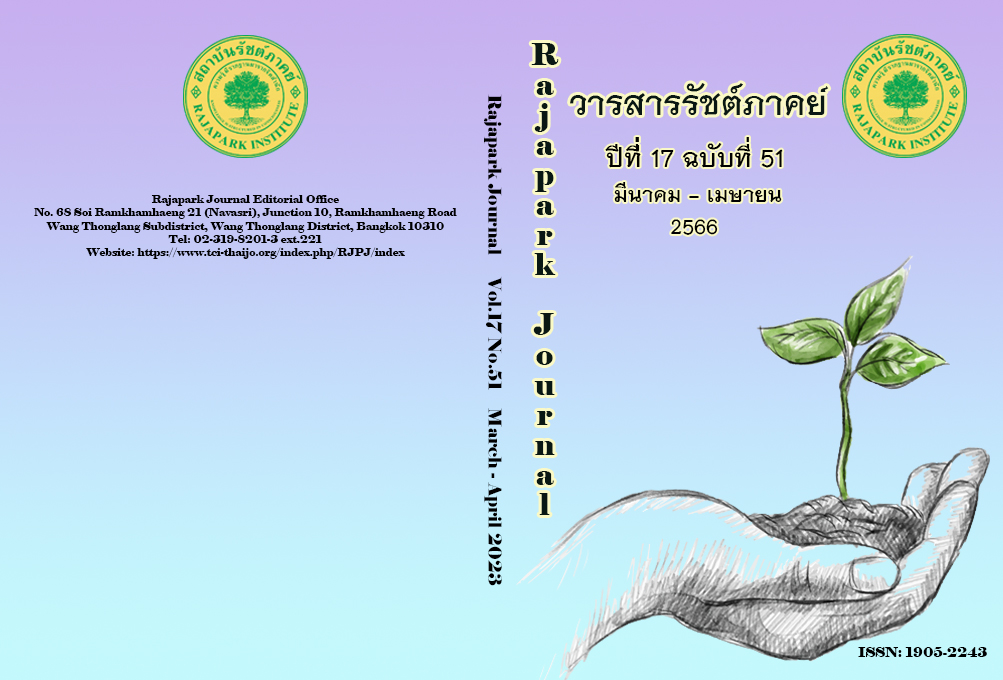ระบบนิเวศการบริหารสถานศึกษาเอกชน
Main Article Content
บทคัดย่อ
การวิจัยครั้งนี้มีวัตถุประสงค์เพื่อ 1) ศึกษาองค์ประกอบของระบบนิเวศการบริหารสถานศึกษาเอกชน และ 2) ศึกษาวิเคราะห์องค์ประกอบเชิงยืนยันองค์ประกอบของระบบนิเวศการบริหารสถานศึกษาเอกชน การวิจัยนี้เป็นการวิจัยแบบผสานวิธี โดยใช้แนวคิดเชิงประยุกต์จากทฤษฎีระบบนิเวศวิทยาเป็นกรอบการวิจัย กลุ่มตัวอย่างที่ใช้ในการเก็บรวบรวมข้อมูลเชิงปริมาณ จำนวน 250 คน จากผู้เชี่ยวชาญ ผู้บริหารสถานศึกษา ครู และบุคลากรทางการศึกษาของโรงเรียนเอกชนในระบบ ในพื้นที่กรุงเทพมหานครและปริมณฑล สังกัดสำนักงานคณะกรรมการส่งเสริมการศึกษาเอกชน กระทรวงศึกษาธิการ วิเคราะห์ข้อมูลด้วยค่าสถิติเชิงพรรณนา (Descriptive Statistics) ได้แก่ ค่าร้อยละ ค่าเฉลี่ย (Mean) และค่าความเบี่ยงเบนมาตรฐาน (SD) และการวิเคราะห์องค์ประกอบเชิงยืนยัน (Confirmatory Factor Analysis: CFA) ผลการวิจัย พบว่า 1. ระบบนิเวศการบริหารสถานศึกษาเอกชนมี 7 องค์ประกอบหลัก ได้แก่ (1) ความเป็นโครงสร้างที่มีองค์ประกอบ (structural and components) (2) ความเป็นเชิงระบบ (system and systematic) (3) ความเป็นสหวิทยาการผสมผสานหลากหลายมโนทัศน์ (interdisciplinary) (4) ความเป็นเครือข่ายแห่งปฏิสัมพันธ์ (interaction network) (5) ความเป็นพลวัตแบบปรับสู่สมดุล (equilibrium dynamic) (6) การบูรณาการอยู่ร่วมกันแบบหลากหลาย (diversity integration) และ (7) การเกื้อกูลเสริมถ่ายพลัง (synergy) และ 2. ผลการตรวจสอบความสอดคล้องขององค์ประกอบทั้ง 7 คุณลักษณะหลัก 42 องค์ประกอบย่อยนั้น มีค่าสัมประสิทธิ์สหสัมพันธ์ขององค์ประกอบสัมพันธ์กันทางบวกอย่างมีนัยสำคัญทางสถิติที่ระดับ .01
Article Details

อนุญาตภายใต้เงื่อนไข Creative Commons Attribution-NonCommercial-NoDerivatives 4.0 International License.
ทัศนะและความคิดเห็นที่ปรากฏในวารสาร ถือเป็นความรับผิดชอบของผู้เขียนบทความนั้น และไม่ถือเป็นทัศนะและความรับผิดชอบของกองบรรณาธิการ
เอกสารอ้างอิง
Agranoff, R. (2006). Inside Collaborative Networks: Ten Lesson for Public managers. Public Administration Review, 66(6), 56-65. https://doi.org/info:doi/
Barney, J. (1991) Firm Resources and Sustained Competitive Advantage. Journal of Management, 17, 99-120. http://dx.doi.org/10.1177/014920639101700108
Berns, J. et al. (2005). Education Policy in Multi-Ethnic Societies: A Review of National Policies that Promote Coexistence and Social Inclusion. http://www.brandeis.edu/ethics/pdfs/publications/EducationPolicy.pdf
Chuichareon, A. (2019, Jan 26). Learning Ecosystem. Post Today Online. https://www.posttoday.com/economy/news/578269
Daft, R.L. (2008). New Era of Management (2nd ed). Thomson South-Western.
Diaz-Gibson, J. Daly, A.J. Balslev, G., Civis, M., & Liou, Y-H. (2020). The School Weavers Tool: Supporting School Leaders to Weave Learning Ecosystem. School Leadership and Management, 41(3). DOI:10.1080/13632434.2020.1770210
Erawan, P. (2019). Research and Organization Development in Schools (3rd ed.). Chulalongkorn University.
Grubb. P.J., & Whittaker, J.B. (1989). Toward a More Exact Ecology: 30th Symposium of the British Ecological Society. Cambridge University Press.
Hoy, W.K., & Miskel, C.G. (2013). Educational Administration: Theory, Research, and Practice (8th ed.). McGraw-Hill.
Itami, H. (1987), Mobilizing Invisible Assets. Harvard University Press.
Katane, I. (2009). Ecology of Education as a New Interdisciplinary Research Trend. Latvia University of Agriculture.
Kunthon, K. (2011, Feb 11). The Concept of Education Management in a Diverse Society Abroad. GotoKnow. https://www.gotoknow.org/posts/545057
Luksha, P., Cubista, J., Laszlo, A., Popovich, M., & Ninenko, I. (2018). Educational Ecosystems for Societal Transformation. Global Education Futures.
National Geographic. (2019, Oct 9). Ecosystem. NGThai. https://ngthai.com/science/25251/ecosystem/
Odum, E.P., & Barrett, G.W. (2005). Fundamentals of Ecology (5th ed.). Thomson Brooks.
Office of the Private Education Commission. (2020). Annual Report of 2020. Office of the Private Education Commission.
Office of the Basic Education Commission, Ministry of Education. (2010). School Network Standards: Networking Guide Jointly Develop and Promote the Potential of Learners. Agricultural Cooperative Printing Demonstrations of Thai co., Ltd.
Raj, S., & Verma, M. (2012). Ecology in Education for Peace: Implications for Teacher Education. IJERT, 3(4), 50-55.
Smith, R.G. (1996). The Structure of Communication. School Health, 36(5), 218-222. https://doi.org/10.1111/j.1746-1561.1966.tb05564.x
Sutawong, W., Wetcha, P., Yawirach, P., & Toonkeaw, S. (2019). The Dynamic of Administration Affecting Education Quality of Schools under Chiang Rai Primary Educational Service Area Office 1. Journal of Social Academic, 12(2), 271-281.
The Institute for the Promotion of Teaching Science and Technology (IPST). (2017). Biology.
Wang, C.L., & Ahmed, P.K. (2007). Dynamic Capabilities: A Review and Research Agenda. International Journal of Management Reviews, 9(1), 31-51.


